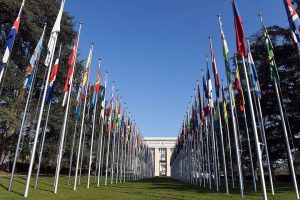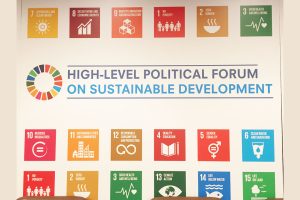March 2018: The UN Economic Commission for Europe (UNECE) released a compilation of case studies on the SDGs under in-depth review at the 2018 session of the UN High-level Political Forum on Sustainable Development (HLPF). The case studies supported peer learning round tables during the Regional Forum on Sustainable Development (RFSD) for the UNECE Region, which convened from 1-2 March 2018.
The case studies are based on national experiences in implementing the selected Goals: SDG 6 (clean water and sanitation); SDG 7 (affordable and clean energy); SDG 11 (sustainable cities and communities); SDG 12 (responsible consumption and production); and SDG 15 (life on land). They feature concrete policy measures taken by governments, proposals by governments and other stakeholders to address identified challenges, and suggestions on how peers can adopt best practices.
Case studies on water: share progress towards universal access to water and sanitation in Portugal, Romania, Serbia, Moldova; describe the balance among multiple needs for water in Finland and Switzerland; and highlight water supply and sanitation in Germany under the Protocol on Water and Health, the German national strategy for micro-pollutants and sewage sludge reforms. Finland’s case study on optimizing water allocation for energy and hydrological extremes underscores the importance of joint water management in flood and drought control (SDG 6), endangered species protection (SDG 15), navigation, recreation and energy security (SDG 7).
Finland and Russia share 20 rivers with joint monitoring and management plans, in line with SDG 6.5.
Finland and the Russian Federation share “hundreds of rivers crossing the border,” including 20 that have joint monitoring and management plans, in line with SDG target 6.5 on transboundary cooperation in integrated water resources management (IWRM). The case study highlights how water allocation rules for the Vuoksi river system implement a discharge rule and risk management plan to minimize flood and drought damage and water fluctuation and optimize hydropower production. Replicable aspects of the case study include the importance of mutual understanding and political will, institutional capacities, appropriate frameworks, joint hydrological monitoring and forecasting and data exchange.
On SDG 12, Moldova highlights its organic farming sector as it supports local livelihoods. The Government of Moldova is introducing reforms to stimulate the creation of goods and services using non-polluting processes and services, conserve energy and natural resources, promote a healthy, safe environment for workers, communities and consumers, and reward the industry’s workforce for innovations. Results include: an “impressive performance record” by the wine industry, which is home to the largest wine collection in the world; and development of digital maps of soil quality to help farmers determine the appropriate agricultural products for their soil, which, in one example, helped producers postpone seed planting and germination in an area that was at risk of landslides. On replication, the case study recommends establishment of broad based public-private sector consultations to inform reform decisions and suggests replicating the industry’s evidence-based analysis.
SDG 15 case studies focus on the sustainable management of forests and ecosystems. They feature examples of: wood value chains in Austria; forest products and the bio-economy in Finland; sustainable forest management in the green belt of Astana, Kazakhstan; the impact of IKEA on people, society and planet; the role of carbon forests in enhancing climate change mitigation efforts in Poland; and the European INTEGRATE network, which aims to enhance nature conservation in sustainably managed forests.
On carbon forests, a sub-national case study shares how the Polish State Forests’ climate protection project has employed management practices to enhance carbon stocks in forests and maximize the accumulation effect without causing harm to biodiversity or the forests’ water retaining function. Poland has introduced these activities across 26 forest districts, covering nearly 12,000 ha, and plans to sell the additional organic carbon.
The UNECE RFSD aimed to foster mutual learning and support UNECE countries in accelerating national progress on the 2030 Agenda for Sustainable Development. The RFSD’s outcomes will contribute to regional input for the 2018 HLPF. [Case Study Compilation] [UNECE Regional Forum Webpage]
SDGs
Issues
- Integrated Water Resources Management,
- Follow-Up and Review,
- Mitigation,
- National Action,
- Biodiversity,
- Sanitation,
- Hydropower,
- Transboundary Water,
- Climate Change,
- Water Quality,
- Sustainable Use,
- SFM,
- Energy,
- Forests & REDD,
- Governance,
- Sustainable Consumption & Production,
- Sustainable Development,
- Water & Sanitation


